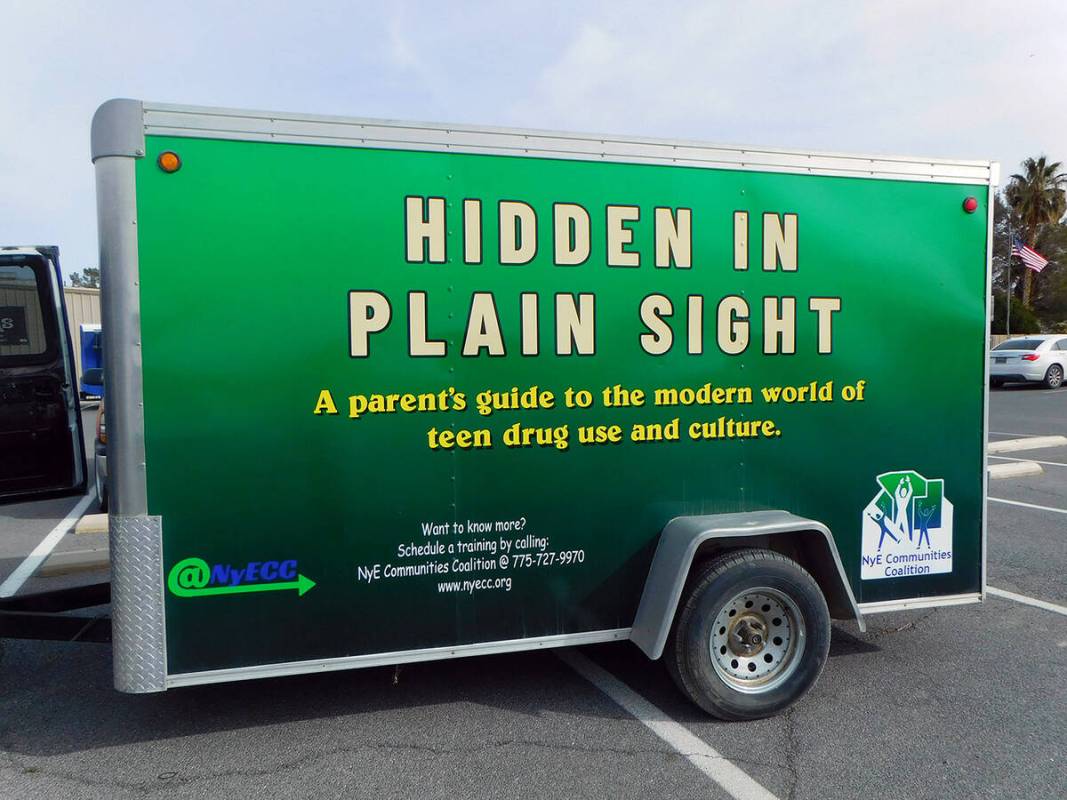
It’s a time-honored truth that teenagers seek to push their boundaries and experiment with new things as they mature and unfortunately, that exploration of the world can sometimes lead to substance use and abuse.
In an effort to ensure adults all across Nye, Lincoln and Esmeralda counties have the knowledge they need to spot potential problems with the youth they interact with, the NyE Communities Coalitions’ YACC club is utilizing a real-world model of a teen’s bedroom, which the group has dubbed the “Drug Paraphernalia Education Trailer” or DPET.
“The original idea came from the youth themselves,” NyECC Youth Leadership Development Coordinator Andrew Gonzales told the Pahrump Valley Times. “We were doing drug paraphernalia education and training, vaping prevention training, marijuana prevention training and getting everyone kind of up to date on these new trends that are happening, because as you know, it’s constantly changing.
“A couple of our older members of YACC, which is Youth Advocates Changing Communities, said they wished we had a better place to show people all of this stuff, rather than just laying it out on tables. Something where they could say, ‘This is where you might actually find this,’ something like a more real-life situation,” Gonzales explained.
With the idea broached, Gonzales immediately started doing research and found that some organizations, primarily on the East Coast and in the Midwest, were utilizing mock-ups of a teen’s bedroom for just such a purpose. Taking this a step further, YACC members suggested a mobile model, one which could be transported all around NyECC’s service area. This would allow for greater education potential without the need for groups of adults to head to the coalition campus for the drug paraphernalia training.
Gonzales said he pitched the idea of using a small enclosed trailer to YACC and the members sprang into action.
“This trailer used to be used for our DUI situations but that technology had gotten very old and this was a great way to give the trailer a new life,” Gonzales stated. “And the youth built this themselves, they put in the side panels, they researched and then built all the furniture, they installed the carpet, they researched and picked all of the paraphernalia, they did all of it.”
The model of YACC is youth-led, adult-guided, Gonzales remarked, and therefore all of the DPET presentations are done by the youth themselves.
“We teach them how to do public speaking, how to do their research, how to provide accurate information,” Gonzales said. “And it’s one thing when this information is coming from an adult; it’s entirely another when it’s middle school and high school-age people telling you about all of this.”
Gonzales noted that YACC educates on much more than just alcohol, nicotine and marijuana, too. “They wanted to approach methamphetamine, designer drugs — like Molly and Ecstasy, prescription drugs — because those are the issues that are happening. They wanted to tie in everything,” he detailed.
Details regarding the precise nature of the items used in the DPET that are actually drug paraphernalia will not be printed. Gonzales said he does not want to give teens any new ideas for subterfuge. However, parents should know that many of the items appear as normal, everyday products or novelties, allowing them to blend in to a child’s bedroom with ease.
Everything used for demonstration in the DPET was purchased without the use of an ID, even when the products were specifically labeled for those over the age of 21, Gonzales noted. Some were bought online while others were purchased right in town at a local vape shop. Many of the products come with vibrant colors and designs or seem cartoonish. Additionally, Gonzales said that drug culture itself has evolved, remarking, “Gone are the days of where it all looks dirty and dark, with a crack pipe and a spoon and a needle. Now, it’s more sleek, it’s been modernized, it’s been made to appeal to the modern person.”
Gonzales said the DPET gives adults the opportunity to learn how to best approach what can be an uncomfortable conversation.
“The youth are very adamant about this; fear tactics do not work. Risky behavior actually becomes attractive and a lot of youth have the idea that, ‘It can’t happen to me.’ So the youth help adults, whether they are parents, teachers, nurses, club leaders, coaches or anything else, understand how to have a conversation with youth,” he said. “Adults are the first line of prevention and just having that conversation can make all the difference.”
Anyone interested in a DPET presentation can schedule one by calling the NyECC at 775-727-9970.
Contact reporter Robin Hebrock at rhebrock@pvtimes.com